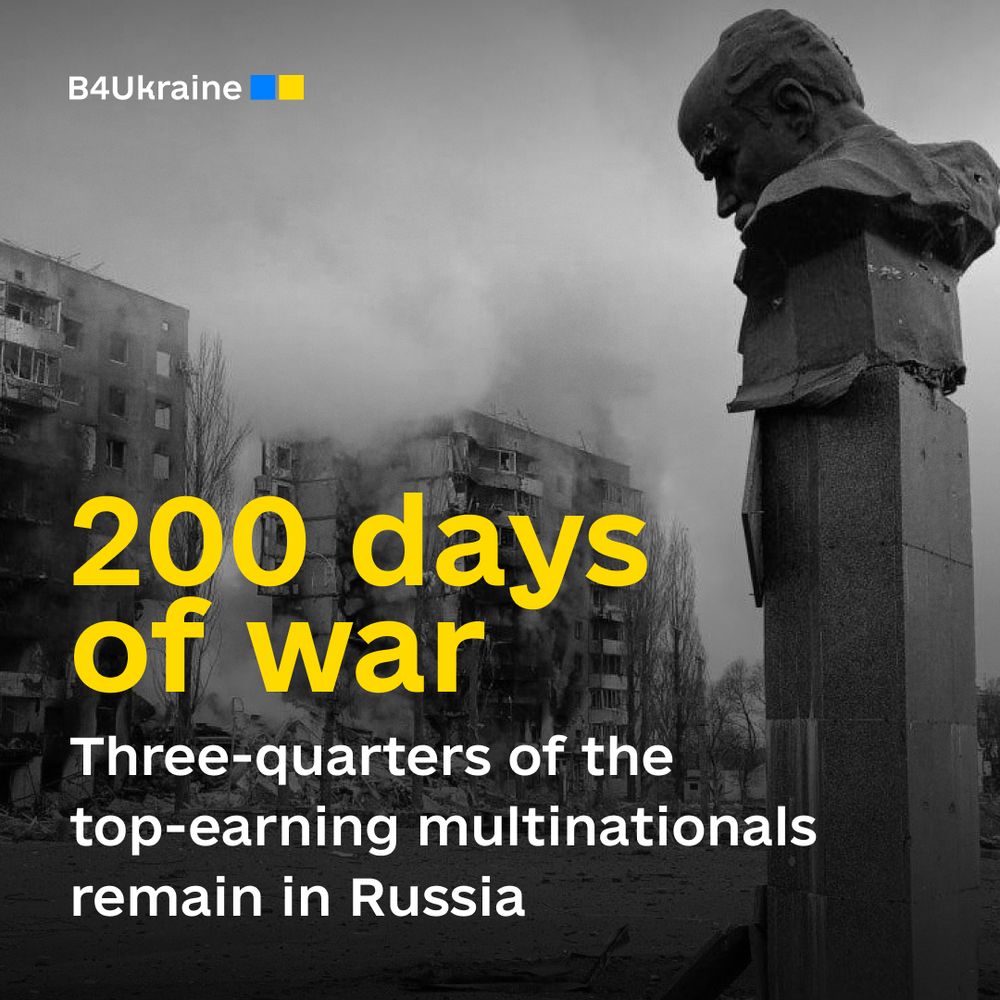
Three-quarters of top-earning multinationals remain in Russia, even after 200 days of Russian aggression, war crimes, and mass atrocities against civilians in Ukraine. To date, only 105 companies have exited the Russian market completely. At the same time, more than 1610 international companies, generating at least $171 billion of local revenue annually, continue to do business in Russia, according to analysis by B4Ukraine - a coalition of Ukrainian and international civil society organizations.
B4Ukraine is calling for companies to exit Russia immediately and ensure their revenues do not continue to underwrite the war and enable gross human rights abuses.
“Russia needs approximately $1 billion a day to supply its frontline with soldiers, equipment, and weapons. By continuing operations in Russia, international businesses are enabling Russia’s war effort,” said Andrii Onopriienko, Deputy Development Director of the Policy Research Department at the Kyiv School of Economics Institute. “The companies that remain pay corporate and payroll taxes to the Russian government as well as salaries to their 690,000 employees in Russia. They are not neutral actors in Russia’s war of aggression against Ukraine.”
Many of the companies remaining in Russia originate from prosperous democracies whose governments have pledged high levels of support for Ukraine. 296 American, 245 German, 107 French, 94 British, and 97 Japanese companies are still operating in Russia on a full or limited scale.
Many companies remaining active in Russia stands at odds with public perceptions of a mass corporate exodus. “The reason why the public is under the impression that most of the major international brands have already left Russia is that most of the companies that downscale and suspend operations do it loudly while 8 in 10 companies doing business at some scale in Russia have kept silent about it. Silence is their tactic to wait out the war,” explains Nataliia Popovych, Founder of One Philosophy and WeAreUkraine.info.
As part of their responsibility to respect human rights, B4Ukraine is calling on companies – whether or not in sectors subject to compliance with sanctions and export controls – to undertake heightened human rights due diligence. “Value chain analysis reveals that significant investments, joint venture operations, and support services of multinational companies continue apace, especially in at-risk industries like oil and gas, consumer goods, and banking. Most of these are the same companies that claim to abide by the UN Guiding Principles for Business and Human Rights (UNGPs) and its call for human rights due diligence. Unfortunately, it’s the ‘diligence’ that’s lacking,” explains Richard Stazinski, Executive Director of the Heartland Initiative.
Last week, the Business & Human Rights Resource Centre launched a new monitoring tool to enhance transparency around businesses’ human rights due diligence practices in Russia. Four hundred multinational companies were invited to respond to a survey about human rights due diligence related to their operations and investments in Russia and Ukraine. Only 39 companies responded, indicating that few companies are willing to admit how little they have done to identify and address their connections to Russia’s violations of international humanitarian and human rights law, in line with their responsibilities under the UNGPs.
“Continuing operations in Russia in pursuit of profits is a short-sighted and high-risk strategy,” said Valeriya Melnichuk, one of the co-founders of the BoycottRussia campaign. “Companies prosper under a rules-based international order - and Russia’s invasion of Ukraine is destabilising this wholescale. The only way to secure future conditions for prosperity is to completely defund Russia’s war machine.”
“Multinational corporations have long undertaken political risk analysis. Russia’s invasion of Ukraine underscores the critical importance of combining political risk analysis with human rights due diligence when acts of aggression threaten to harm civilian populations,” said Bennett Freeman, former Senior VP for Sustainability Research and Policy at Calvert Investments.